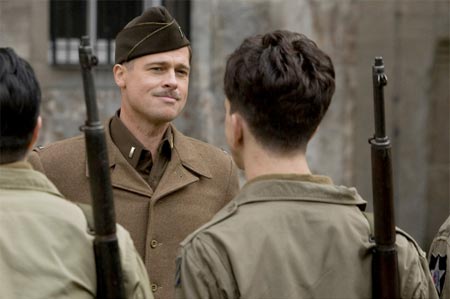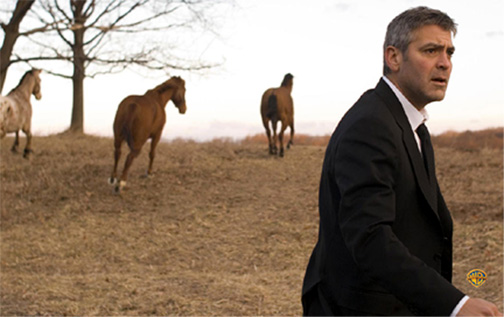I will give a 'reading' of this film as briefly as I can. I can't believe I'll spoil it for anyone who hasn't seen it, but maybe at least some who have seen it will re-consider their assessment. I found Inglourious Basterds to be one long cinematic joke--an ironic joke. Nothing in this movie should be interpreted without considering that Tarantino wants you to understand you're watching a movie. The problem is that many people who watch movies don't think about the fact they're watching one, or forget they're watching one. Tarantino wants you to be aware of this--what better way than to create some very "bad" cinematic moments? IN other words, this movie is a satire of movie convention. I think that is why there are a number of 'sitting around the table' scenes that are are very long and tedious. They are not meant to be believable as cinematic art because if they were they would be defeating the purpose of the film. They're artifice and the best way to demonstrate artifice is to point it out directly. Goddard did this when he filmed light cables that threaded their way through a mise en scene right where the actors were performing. Tarantino does it here by creating both utter cliches and utterly 'bad' filmmaking. That a German officer would speak perfect French to a French farmer, then stops, says he has limited French-speaking abilities, and then speaks in English to the French farmer who happens to speak English is pretty goofy, and it's boring. But It's meant to be. When a Nazi hunter doesn't order his men who are sitting around a jeep to run down and kill a Jewish girl while she is running through the countryside--and instead had a grin on his face is equally absurd--the suggestion is that they will meet again one day. How does he know this? Because it's a movie.
But that's OK, because we're not seeing an attempt to create a cinematic version or interpretation of historical events because all such movies are fabrications. All movies are fabrications, of course, and Tarantino is trying to remind the viewers of the fact. We are seeing an exercise in how a filmmaker controls what goes into the art. If Tarantino wants to create a bad scene, then he does so. It's as if he were saying, "I'm so in command of the grammar of cinema that I I'll make this scene too long, contrived, cliched, dull, etc., just to show I know the good and bad aspects of cinema.
He even has one actor, Mike Myers, play a cliched version of his own cliched actor's persona. He's not portraying a British officer. He's portraying Mike Myers. The range of jokes in the film go from the sublime to the ridiculous, the latter evident when Brad Pitt tries to fake an Italian accent at a gathering of SS officers. That is straight out of The Three Stooges or Mel Brooks. Additionally, the alteration of the Nazi sniper spy movie and the subsequent flames leaping around the movie screen have all the production values of an Ed Wood movie. You don't see "Plan 9 from Outer Space" because it's a good movie. You see it because it's a bad movie, although you might say it's so bad that it's good.
I'm not suggesting that I'm a Tarantino fan. I really don't care what movies he makes or why. I haven't seen "Kill Bill" which I believe he directed. This stuff isn't rocket science, so I wouldn't use such words as 'genuis' or 'brilliant.' But at least it's a change of pace from the usual Hollywood garbage.
You could take every scene and shot, and about every line of dialogue from this film and find a meta-communicative aspect. That's why it would be way too tedious to truly critique the film. It would take a thousand pages or so. But you get the idea. Now go find a few 'bad jokes' of your own if you have the inclination. BTW, what better way to show the artifice of film titles, and in particular, the way titles of films are used to stand out as a form of a film's PR than to misspell one?









